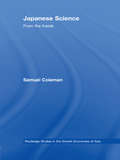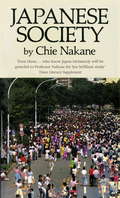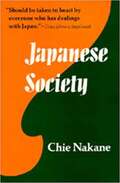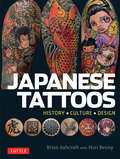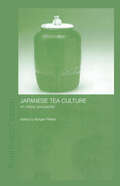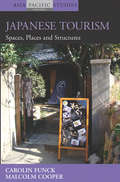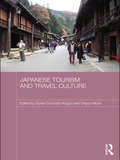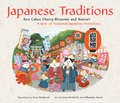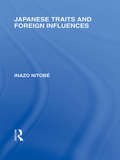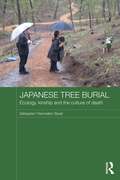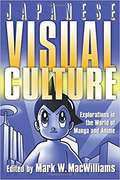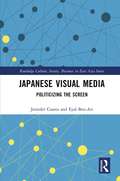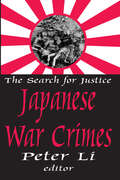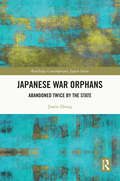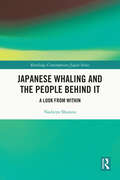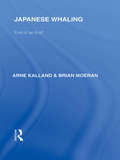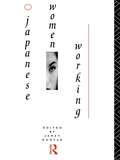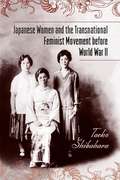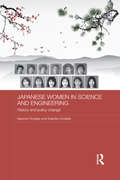- Table View
- List View
Japanese Science: From the Inside (Routledge Studies In The Growth Economies Of Asia #Vol. 25)
by Samuel ColemanThis ethnographic study of Japan's scientists looks firsthand at career structures and organizational issues that have hampered the advancement of scientists and scientific research in Japan. It provides analysis of the problem of career mobility in science, the status quo in university and government laboratories, relations between scientists and
Japanese Society
by Chie NakaneWhy do the Japanese almost always go for holidays in groups? Do Japanese families experience our sort of 'family life'? Why do conversations with Japanese friends and acquaintances often seem to come to an abrupt halt just when they're getting interesting - that is, a little controversial? What motivates the Japanese man in the street? Professor Nakane, writing with an intimate knowledge of her own people, provides in this fascinating book the answers to these and many other perplexing questions. Using the structure of Japanese society as the basis of her analysis, rather than explaining it in cultural or historical terms, Professor Nakane begins by examining one-to-one relationships, following through to the structure of the group and finally that of the society as a whole.
Japanese Society (Center For Japanese Studies, UC Berkeley #4)
by Chie NakaneThis short work presents a configuration of the important elements to be found in contemporary Japanese social life, and attempts to shed new light on Japanese society. Nakane deals with his own society as a social anthropologist using some of the methods which he was accustomed to applying in examining any other society. However, its form is not that of a scientific thesis (as may be seen at once from the absence of a bibliography; the author also refrains from quoting any statistical figures or precise data directly obtained from field surveys). Nakane has tried to construct a structural image of Japanese society, synthesizing the major distinguishing features to be found in Japanese life. He has drawn evidence almost at random from a number of different types of community to be found in Japan today--industrial enterprises, government organizations, educational institutions, intellectual groups, religious communities, political parties, village communities, individual household and so on. Throughout this investigation of groups in such varied fields, Nakane has concentrated my analysis on individual behavior and interpersonal relations which provide the base of both the group organization and the structural tendencies dominating in the development of a group.
Japanese Society (Center For Japanese Studies, Uc Berkeley Ser. #4)
by Chie NakaneWhy do the Japanese almost always go for holidays in groups? Do Japanese families experience our sort of 'family life'? Why do conversations with Japanese friends and acquaintances often seem to come to an abrupt halt just when they're getting interesting - that is, a little controversial? What motivates the Japanese man in the street? Professor Nakane, writing with an intimate knowledge of her own people, provides in this fascinating book the answers to these and many other perplexing questions. Using the structure of Japanese society as the basis of her analysis, rather than explaining it in cultural or historical terms, Professor Nakane begins by examining one-to-one relationships, following through to the structure of the group and finally that of the society as a whole.
Japanese Swords
by Colin M. Roach"Tracks the fundamental transition from the sword as a mythological instrument to a functional tool for war, and finally to the display art commodity it is today. " - Publishers Weekly Author Colin M. Roach collaborated with top-level artisans, historians, and martial arts experts to create a unique, in-depth study of these magnificent weapons from a historical, iconographical, and technological perspective. In addition to a foreword by seventh degree iaido black belt Nicklaus Suino and a sidebar by Mukansa-level polisher Abe Kazunori, Japanese Swords includes rare looks into the world of Mukansa-level swordsmiths Kawachi Kunihira and Gassan Sadatoshi. Complemented by hundreds of stunning high-resolution photos and downloadable material, Japanese Swords is a must-have addition to any Japanophile's library.
Japanese Tattoos: History * Culture * Design
by Brian Ashcraft Hori BennyThinking of getting a Japanese-style tattoo? Want to avoid a permanent mistake? Japanese Tattoos is an insider's look at the world of Japanese irezumi (tattoos).Japanese Tattoos explains the imagery featured in Japanese tattoos so that readers can avoid getting ink they don't understand or, worse, that they'll regret. This photo-heavy book will also trace the history of Japanese tattooing, putting the iconography and kanji symbols in their proper context so readers will be better informed as to what they mean and have a deeper understanding of irezumi. Tattoos featured will range from traditional tebori (hand-poked) and kanji tattoos to anime-inspired and modern works-as well as everything in between. For the first time, Japanese tattooing will be put together in a visually attractive, informative, and authoritative way.Along with the 350+ photos of tattoos, Japanese Tattoos will also feature interviews with Japanese tattoo artists on a variety of topics. What's more, there will be interviews with clients, who are typically overlooked in similar books, allowing them to discuss what their Japanese tattoos mean to them. Those who read this informative tattoo guide will be more knowledgeable about Japanese tattoos.
Japanese Tea Culture: Art, History and Practice
by Morgan PitelkaFrom its origins as a distinct set of ritualised practices in the sixteenth century to its international expansion in the twentieth, tea culture has had a major impact on artistic production, connoisseurship, etiquette, food, design and more recently, on notions of Japaneseness. The authors dispel the myths around the development of tea practice, dispute the fiction of the dominance of aesthetics over politics in tea, and demonstrate that writing history has always been an integral part of tea culture.
Japanese Telecommunications: Market and Policy in Transition (Routledge Studies in the Growth Economies of Asia)
by Ruth Taplin Masako WakuiPresenting a comprehensive survey of the telecommunications industry in Japan, Taplin and Wakui cover the different sectors of the industry – including mobile, broadband and satellite, whilst considering key questions such as the structure and economics of the industry, government policy, and international relations issues connected to the industry. The volume brings together unique analysis by renowned experts in the telecommunications field. One major overall problem is that, unlike many other industries, Japan has lagged behind other countries in telecommunications. Japanese Telecommunications considers why this should be so, showing how far this is attributable to an unmodernized industry structure, and assessing the measures being taken to address the problem. After over a decade of struggle, Japan has recorded rapid uptake of broadband, and Japanese advanced mobile services have become increasingly successful on a global scale. Japan has also undergone regulatory reform, and competition policy is now given top priority by government. Taplin and Wakui examine the most recent developments and provide signposts for the future.
Japanese Tourism
by Malcolm Cooper Carolin FunckThe changing patterns of Japanese tourism and the views of the Japanese tourist since the Meiji Restoration, in 1868, are given an in-depth historical, geographical, economic and social analysis in this book. As well as providing a case study for the purpose of investigating the changing face of global tourism from the 19th to the 21st Century, this account of Japanese tourism explores both domestic social relations and international geographical, political and economic relations, especially in the northeast Asian context. Socio-cultural and geographical analysis form the research framework for the book, in three ways: first, there is an emphasis on scale as tourism phenomena and their implications are discussed both in a global context and at the national, regional and local levels; second, the discussion is informed by primary data sources such as censuses and surveys; and third, the incorporation of fieldwork and case studies adds concreteness to the overall picture of Japanese tourism. This book is a significant addition to an area of study currently under-represented in the literature.
Japanese Tourism and Travel Culture (Japan Anthropology Workshop Series)
by Sylvie Guichard-Anguis Okpyo MoonThis book examines Japanese tourism and travel, both today and in the past, showing how over hundreds of years a distinct culture of travel developed, and exploring how this has permeated the perceptions and traditions of Japanese society. It considers the diverse dimensions of modern tourism including appropriation and consumption of history, nostalgia, identity, domesticated foreignness, and the search for authenticity and invention of tradition. Japanese people are one of the most widely travelling peoples in the world both historically and in contemporary times. What may be understood as incipient mass tourism started around the 17th century in various forms (including religious pilgrimages) long before it became a prevalent cultural phenomenon in the West. Within Asia, Japan has long remained the main tourist sending society since the beginning of the 20th century when it started colonising Asian countries. In 2005, some 17.8 million Japanese travelled overseas across Europe, Asia, the South Pacific and America. In recent times, however, tourist demands are fast growing in other Asian countries such as Korea and China. Japan is not only consuming other Asian societies and cultures, it is also being consumed by them in tourist contexts. This book considers the patterns of travelling of the Japanese, examining travel inside and outside the Japanese archipelago and how tourist demands inside influence and shape patterns of travel outside the country. Overall, this book draws important insights for understanding the phenomenon of tourism on the one hand and the nature of Japanese society and culture on the other.
Japanese Tourists: Socio-Economic, Marketing, and Psychological Analysis
by K. S. Kaye ChonFind out how to entertain all types of Japanese tourists from student groups to retirees!Would a Japanese traveler rather see pictures of beautiful landscapes or smiling Japanese couples in a tourist brochure? Will you attract more Japanese tour groups by promising them independence and adventure or excellent food? Given the importance of Japanese tourists to the global travel industry, understanding their travel-related behavior has become an essential item in the tourism research agenda. Japanese Tourists: Socio-Economic, Marketing, and Psychological Analysis investigates the specific needs, behaviors, and desires of this growing segment of the international tourism market.Japanese tourists spend billions of dollars abroad every year, and travel destinations as far apart as Australia and Manhattan compete fiercely for their custom. By taking cultural traits into account, travel industry professionals can better understand exactly what kinds of amenities, accommodations, service, and total experience Japanese travelers are looking for. This volume of original research and well-grounded theory elucidates the specific factors that go into Japanese travel and buying decisions, whether the travelers are Japanese ”office ladies” seeking bargains in Hong Kong or a group of senior citizens hoping to see the Northern Lights.Japanese Tourists: Socio-Economic, Marketing, and Psychological Analysis discusses a full range of issues crucial to attracting Japanese tourism, including:how stage of life affects travel behavior why Japanese people book overseas weddings and group honeymoon tours whether legalized gambling would increase or discourage Japanese tourism in Hawaii how issues of perceived safety affect choice of travel destinations what souvenirs mean in Japanese culture which travel images are most likely to attract Japanese tourists what sources of information Japanese travelers use to help them select destinationsJapanese Tourists offers the most up-to-date international studies on the socioeconomic, marketing, and psychological factors affecting Japanese people traveling abroad. This volume is an invaluable resource for travel professionals seeking to break into the tough but lucrative Japanese outbound-tourism market.
Japanese Traditions
by Willamarie Moore Setsu BroderickA delightful look at Japanese culture and family life, Japanese Traditions is an intricately illustrated romp through the childhood reminiscences of author/illustrator Setsu Broderick. Told via a series of short text blocks and lighthearted illustrations based on cats, Japanese Traditions displays seasonal festivals and activities such as O-Bon, O-hanami (cherry blossom viewing) and preparing for the New Year.While enjoying the charming illustrations of a family of Japanese cats, the author shares her warm childhood memories of many Japanese customs, such as gathering around the kotatsu to stay warm, throwing soybeans to keep away ogres and hanging handmade teru-teru-bozu dolls out the window to stop the rain. There are also many traditional Japanese games, toys, foods and celebrations taught through the illustrations. All in all, Japanese Traditions provides a magical feast for children of all ages.
Japanese Traditions
by Willamarie Moore Setsu BroderickA delightful look at Japanese culture and family life, Japanese Traditions is an intricately illustrated romp through the childhood reminiscences of author/illustrator Setsu Broderick. Told via a series of short text blocks and lighthearted illustrations based on cats, Japanese Traditions displays seasonal festivals and activities such as O-Bon, O-hanami (cherry blossom viewing) and preparing for the New Year.While enjoying the charming illustrations of a family of Japanese cats, the author shares her warm childhood memories of many Japanese customs, such as gathering around the kotatsu to stay warm, throwing soybeans to keep away ogres and hanging handmade teru-teru-bozu dolls out the window to stop the rain. There are also many traditional Japanese games, toys, foods and celebrations taught through the illustrations. All in all, Japanese Traditions provides a magical feast for children of all ages.
Japanese Traits and Foreign Influences (Routledge Library Editions: Japan)
by Inazo NitobeThis volume collects together essays and lectures given by the author from 1922-1927 to a variety of international audiences. Together they illuminate essential aspects of the Japanese mentality and way of life, particularly in social, religious and linguistic aspects.
Japanese Tree Burial: Ecology, Kinship and the Culture of Death (Japan Anthropology Workshop Series)
by Sébastien Penmellen BoretTree burial, a new form of disposal for the cremated remains of the dead, was created in 1999 by Chisaka Genpo, the head priest of a Zen Buddhist temple in northern Japan. Instead of a conventional family gravestone, perpetuating the continuity of a household and its identity, tree burial uses vast woodlands as cemeteries, with each burial spot marked by a tree and a small wooden tablet inscribed with the name of the deceased. Tree burial is gaining popularity, and is a highly-effective means of promoting the rehabilitation of Japanese forestland critically damaged by post-war government mismanagement. This book, based on extensive original research, explores the phenomenon of tree burial, tracing its development, discussing the factors which motivate Japanese people to choose tree burial, and examining the impact of tree burial on traditional views of death, memorialisation, and the afterlife. The author argues that non-traditional, non-ancestral modes of burial have become a means of negotiating new social orders and that this symbiosis of environmentalism and memorialisation corroborates the idea that graveyards are not only places for the containment of human remains and the memorialisation of the dead, but spaces where people (re)construct, challenge, and find new senses of belonging to the wider society in which they live. Throughout, the book demonstrates how the new practice fits with developing ideas of ecology, with the individual’s corporality nourishing the earth and thus re-entering the cycle of life in nature.
Japanese Visual Culture: Explorations in the World of Manga and Anime
by Mark W. MacWilliamsBorn of Japan's cultural encounter with Western entertainment media, manga (comic books or graphic novels) and anime (animated films) are two of the most universally recognized forms of contemporary mass culture. Because they tell stories through visual imagery, they vault over language barriers. Well suited to electronic transmission and distributed by Japan's globalized culture industry, they have become a powerful force in both the mediascape and the marketplace.This volume brings together an international group of scholars from many specialties to probe the richness and subtleties of these deceptively simple cultural forms. The contributors explore the historical, cultural, sociological, and religious dimensions of manga and anime, and examine specific sub-genres, artists, and stylistics. The book also addresses such topics as spirituality, the use of visual culture by Japanese new religious movements, Japanese Goth, nostalgia and Japanese pop, "cute" (kawali) subculture and comics for girls, and more. With illustrations throughout, it is a rich source for all scholars and fans of manga and anime as well as students of contemporary mass culture or Japanese culture and civilization.
Japanese Visual Media: Politicizing the Screen (Routledge Culture, Society, Business in East Asia Series)
by Jennifer Coates Eyal Ben-AriThis book uncovers and explains the ways by which politics is naturalized and denaturalized, and familiarized and de-familiarized through popular media. It explores the tensions between state actors such as censors, politicized and nonpoliticized audiences, and visual media creators, at various points in the history of Japanese visual media. It offers new research on a wide array of visual media texts including classical narrative cinema, television, documentary film, manga, and animated film. It spans the militarized decades of the 1930s and 1940s, through the Asia Pacific War into the present day, and demonstrates how processes of politicization and depoliticization should be understood as part of wider historical developments including Japan’s postwar devastation and poverty, subsequent rapid modernization and urbanization, and the aging population and economic struggles of the twenty-first century.
Japanese War Crimes
by Peter LiThe question of national responsibility for crimes against humanity became an urgent topic due to the charge of ethnic cleansing against the previous Yugoslav government. But that was not the first such urging of legal and moral responsibility for war crimes. While the Nazi German regime has been prototypical, the actions of the Japanese military regime have been receiving increasing prominence and attention. Indeed, Peter Li's volume examines the phenomenon of denial as well as the deeds of destruction.Certainly one of the most troublesome unresolved problems facing many Asian and Western countries after the Asia Pacific war (1931u1945) is the question of the atrocities committed by the Japanese Imperial Army throughout Asia and the Japanese government's repeated attempts to whitewash their wartime responsibilities. The psychological and physical wounds suffered by victims, their families, and relations remain unhealed after more than half a century, and the issue is now pressing. This collection undertakes the critical task of addressing some of the multifaceted and complex issues of Japanese war crimes and redress.This collection is divided into five themes. In "It's Never Too Late to Seek Justice," the issues of reconciliation, accountability, and Emperor Hirohito's responsibility for war crimes are explored. "The American POW Experience Remembered" includes a moving account of the Bataan Death March by an American ex-soldier. "Psychological Responses" discusses the socio-psychological affects of the Nanjing Massacre and Japanese vivisection on Chinese subjects. The way in which Japanese war atrocities have been dealt with in the theater and cinema is the focus of "Artistic Responses." And central to "History Must not Forget" are the questions of memory, trauma, biological warfare, and redress. Included in this volume are samples of the many presentations given at the International Citizens' Forum on War Crimes and Redress held in Tokyo in Decem
Japanese War Orphans: Abandoned Twice by the State (Routledge Contemporary Japan Series)
by Jiaxin ZhongAfter Japan's defeat in August 1945, some Japanese children were abandoned in China and raised by Chinese foster parents. They were unable to return to Japan even during the mass repatriation carried out by the Japanese government in the 1950s. Most of them returned to Japan in the 1980s. They are called Japanese war orphans. They are victims of the Sino-Japanese War and have been exploited and abandoned by the Japanese government. They are also "border people" who have lived in the interstices between two nations, China and Japan, and are migrants who have exploited the gap in economic development between Japan and China to seek individual happiness. Modern East Asia underwent drastic social change. These drastic social changes affected the lives of the Japanese war orphans and their families in a variety of ways. Over the years, Zhong has interviewed Japanese war orphans, their Chinese foster parents, and Japanese volunteers. The title is an interview-based sociological study of the issue of Japanese war orphans. The first half of the Japanese war orphans' lives were spent in China, and the latter half in Japan. It brings to the fore the dramatic personal histories of the Japanese war orphans surviving in the interstices between two nation-states. Through analyzing the issue of Japanese war orphans, the research on the subject makes the following three points: (1) the powerlessness of civilians caught up in modern warfare and the long-lasting effects of modern warfare on the life histories of individuals and their families; (2) the nature of the modern nation-state, which exploits and abandons its citizens as though they were expendable; and (3) immigration as a product of modernization gaps. Scholars pursuing studies in Japanese society and historians of the Sino-Japanese war would find this an ideal read.
Japanese Whaling and the People Behind It: A Look from Within (Routledge Contemporary Japan Series)
by Nadzeya ShutavaThis book explores the recent developments in global and Japanese whaling from the viewpoint of the members of the Japanese whaling community, a perspective that is largely neglected and misinterpreted. Japanese whaling has been one of the most contentious issues in global environmental governance in recent years, and Japan is often harshly criticized for its whaling programs. By distinguishing between the different whaling-related actors and their experiences, this book widens our understanding of why whaling programs continue to exist. Rich in ethnographic data, the book includes in-depth interviews with representatives of the Japanese whaling community, from government officials to fishermen, shedding light on what whaling represents, both historically and today. As an ethnographic study of a divisive and controversial subject, this book will appeal to a wide range of students and scholars, including, but not limited to, those interested in Japanese studies, anthropology, political science, and ocean resource management.
Japanese Whaling?: End of an Era (Routledge Library Editions: Japan)
by Brian Moeran Arne KallandThis book gives a social anthropological account of whaling culture in Japan. When originally published this was the first comprehensive account in English of the history of Japanese whaling, showing how it has given rise to a particular culture. The volume discusses what happens when that culture is threatened. At the same time as explaining the work organization of those involved in whaling, the role of whaling companies in local and national economies, and the role of the whale in the establishment and maintenance of local community identity (ritual, food, gift-giving), the authors address the wider political and so-called "environmental" issues surrounding whaling in general, and Japanese whaling in particular.
Japanese Women Working
by Janet HunterJapanese Women Working provides a wide range of perspectives on the study of working women in Japan over the last century. Contributors address issues of state policy towards and management of women workers, and also provide accounts of the experiences of particular groups of workers: domestic servants, hospital care assistants, textile workers , miners, homeworkers and 'professional' housewives.The book highlights many of the issues and decisions that have faced working women in Japan, and calls into question the accuracy of the prevailing domestic stereotype of Japanese women. Essays included span a period rapid economic change, and look at Japan as an industrializing country, indicating the importance of the overall economic environment, as well as taking into account cultural factors, in determinig women's position in the labour market.Bringing together contributions by historians, economists, anthropologists and management specialists from Europe, Japan and the United States, the book underlines the importance of a multidisciplinary approach to the study of women working. It is a major addition to the existing English language literature on Japanese Women, and will make life easier for non-specialists to inform themselves about a critical area of Japanese social and economic development.
Japanese Women and the Transnational Feminist Movement before World War II
by Taeko ShibaharaThis book traces the development of feminist consciousness in Japan from 1871 to 1941. Taeko Shibahara uncovers some fascinating histories as she examines how middle-class women navigated between domestic and international influences to form ideologies and strategies for reform. They negotiated a humanitarian space as Japan expanded its nationalist, militarist, imperialist, and patriarchal power. Focusing on these women's political awakening and activism, Shibahara shows how Japanese feminists channeled and adapted ideas selected from international movements and from interactions with mainly American social activists. Japanese Women and the Transnational Feminist Movement before World War II also connects the development of international contacts with the particular contributions of Ichikawa Fusae to the suffrage movement, Ishimoto Shidzue to the birth control movement, and Gauntlett Tsune to the peace movement by touching on issues of poverty, prostitution, and temperance. The result provides a window through which to view the Japanese women's rights movement with a broader perspective.
Japanese Women in Leadership (Current Perspectives on Asian Women in Leadership)
by Gary N. McLean Yoshie Tomozumi Nakamura Mayuko HorimotoThis edited book highlights the unique cultural and socioeconomic elements of Japan and the strong influence of those elements on women leaders in the nation. It shows that gender inequality and under-utilization of female talent are deeply rooted in Japanese society, explaining why Japan lags behind other countries in Asia in this regard. The contributors are expert academicians and practitioners with a clear understanding of Japanese women leaders' aspirations and frustrations. This book has critical implications for the development of women leaders in Japan, providing intriguing insights into developing the potential of highly qualified women leaders in diverse Japanese contexts in which traditional cultural expectations and modernized values coexist.
Japanese Women in Science and Engineering: History and Policy Change (Routledge Contemporary Japan Series)
by Naonori Kodate Kashiko KodateThe gender gap in science, technology, engineering and mathematics (STEM) varies greatly from country to country, and the number of Japanese women in these fields remains relatively few. This prompts us to ask why the proportion of female scientists in Japan is still remarkably low and what measures the government, universities and research institutes are taking to address this issue. This book sheds light on historical developments and the current gender equality situation in Japan, through the lens of women in STEM. It shows how a policy of gender equality in science and engineering has been introduced through the coordinated efforts of academia, scientific societies and the government, and how this has led to a slow but steady increase in female representation. The book draws on extensive data including interviews with government officials, scientists and educators in Japan to provide a revealing case study on how the underrepresentation of women in the fields of science, technology and engineering has been approached and dealt with by a national government. It heralds a new era for female scientists, by showcasing several programmes undertaken by government, universities and national research institutions to support multiple career paths for and the progression of female scientists in Japan. Tracing the historical development of Japan’s policies towards women in science and education, this book will be welcomed by students and scholars interested in Japanese studies, comparative social policy, gender studies, employment and the history of science and technology.
